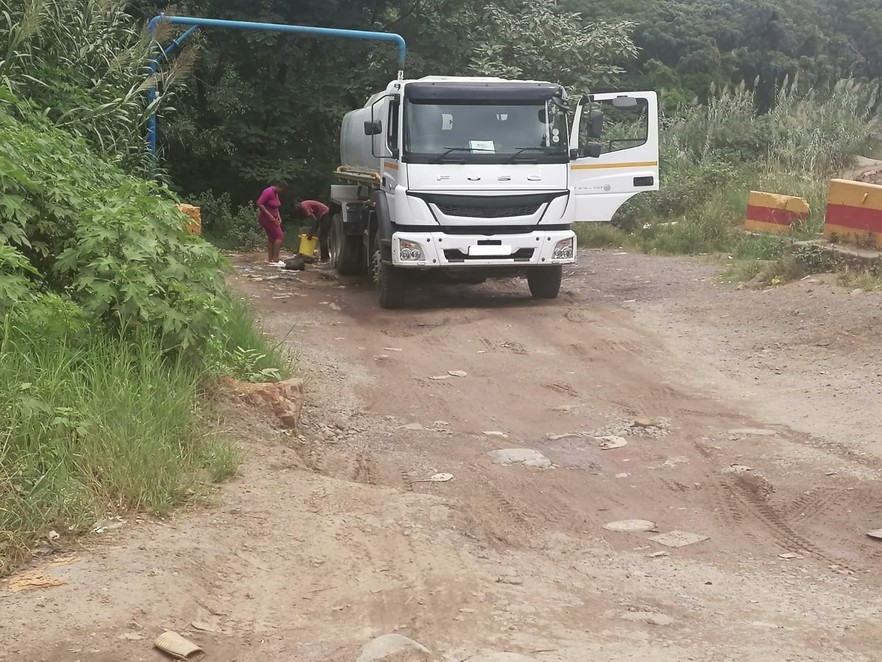
7 March 2024
An unmarked water truck being filled with free municipal water in Verulam. The driver of this truck said he would sell the water to households at R500 for a 5,000 litre container. Photo: Tsoanelo Sefoloko
Unmarked trucks are selling water illegally to families in parts of eThekwini, as the municipality battles to deliver water to some areas.
Verulam, KwaMashu, Phoenix, Tongaat and KwaXimba are among areas hit by water shortages. The eThekwini Municipality uses its own water trucks to deliver free water to areas where there is limited or no running water and has contracted private contractors to add to the service. But in some places, municipal water is being sold from unmarked trucks.
In Verulam, GroundUp spoke to the driver of a water truck who was filling up his tank from a municipal water spout. He confirmed that he was taking this water to sell back to households. He said he would charge R500 to fill a 5,000-litre container. Other drivers were doing the same, he said.
In Adams Mission, on the coast south of eThekwini, GroundUp saw a different water truck stopping at several houses in the area. The driver confirmed that he was selling water, saying he would charge R500 for 5,000 litres. A resident confirmed he had bought 2,500 litres for R250.
According to the Ethekwini Municipality Tariff Tables 2023/2024, there is no charge for water up to 6,000 litres, even when it is supplied through the pipes.
Asked whether the municipality was aware that residents were being sold municipal water, spokesperson Gugu Sisilana said: “Water trucks are not allowed to sell water to residents or businesses under any circumstances. Municipal tankers have decals indicating that water is not for sale. There is also a contact number for reporting any incidents. The tanker supervisors do ad-hoc checks as a deterrent.”
Sisilana said the Verulam case would have to be investigated. But, she said, the municipality has “not officially received any complaints related to the selling of water by employees”, after checking records dating back to 2023.
Sisilana said the municipality owned 157 water trucks, and 151 were currently operational. In addition, the municipality hired trucks from contractors on a day-to-day basis when the need exceeded the capacity of the municipal trucks.
GroundUp sent number plates of trucks selling water to the municipality. Sisilana said the number plates were not those of municipal trucks but she did not comment on whether or not they might be those of contractors hired by the municipality, referring GroundUp to the police.
Residents of Adams Mission, where water shortages have been a problem for a long time, said the municipal water trucks did not come regularly and they had to resort to buying water. They said they could rely on the unmarked trucks to deliver as long as they are willing to pay. The drivers can be contacted via a phone call, according to one of the residents.
Those who cannot afford to pay, have to fetch water from wells or nearby suburbs. The well water is dirty and needs to be purified before drinking. “We are suffering because we are poor,” said one resident.
Although every resident GroundUp spoke to had bought water from trucks or knew of others who had done so, Siphephelo Myandu, ward councillor for Adams Mission, said he had no knowledge of water trucks selling water in his ward.
Adams Mission is equipped with basic water services infrastructure, not designed for a full-pressure system, said Sisilana. A growing number of consumers are also bypassing flow-limiting devices which has increased demand “significantly”, she added. “Despite the municipality’s concerted efforts, the current water supply proves inadequate, leading to rapid depletion of our reservoirs.”
Several residents of one part of Adams Mission sent a letter to the municipality in February pleading for a solution. They have still not received a reply. One business owner, who showed GroundUp the letter, said he’s had no running water for ten years.
“The trucks come maybe once a week, or maybe after two weeks,” he said. Even when the municipal trucks do come they will not fill up a whole rain tank. “We end up buying.”
Selling of water is a criminal offence, a notice on the side of a municipal water truck reminds residents. Photo: Joseph Bracken